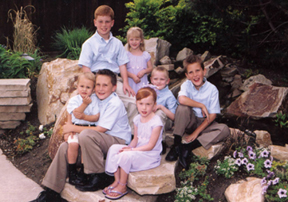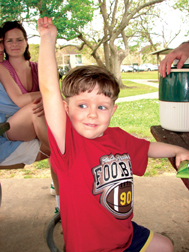|
observer |
|
|
|
|
|
OTHER LINKS |

|

|

|
Shh...! Kids are listening
But wait. Before you wrap-up saying nice things about them (gifted, clever, geniuses) and roll the credits, there is just one small hitch - they're also supposed to be, on the other hand, rude, arrogant and selfish. And their language, why, it could easily make a longshoreman blush! Far from being universally loved, the consensus is that they're a bunch of insolent, foul-mouthed brats. (Phew! Who would ever want to be a kid today?) Typically, parents and 'elders' react in a predictable way, when any mention is made about their kids' behaviour. They roll their eyes and look terribly sad whenever their kids are mentioned, or talk about good old days, when kids were absolute angels. Or else, they pretend it's not their kid, play the blame-game, and pass the buck on the television. But since none of the above are going to have any long-term benefits, we thought it might help to ask a few people. Sumathi Sudhakar, children's writer, says to understand why kids are the way they are, we have to understand how we are. "We are part of a go-getter culture, where bold is beautiful. Be aggressive, thrust yourself forward, speak your mind and get your way - aren't these the mantras we follow in our lives and careers? How can we then expect our kids to be any different?"Vaani Anand, management consultant, feels perhaps kids are being plain innocent. "They just imitate what they hear from adults! When adults do not restrict their language, is it right to expect kids not to mime us?" Agrees Rajalakshmi Anand, lecturer. "In the mad survival-of-the-fittest race, do parents even have the time to instil values in their kids? Are we as parents setting an example by showing tolerance towards our own parents? Isn't it a trifle unfair expecting our children to be embodiments of virtue?"
While it's obvious that parents play a great role, there are several other factors that influence impressionable minds. Shoba Raman, a high-school teacher in a leading school, (who also had the opportunity to observe kids in Vermont, where she had been on a Fulbright teacher's exchange programme says, "The media, peer group, home atmosphere, school and what they do for recreation... everything counts. Why, the peer-influence we experienced in our late teens has started working at 10! The way they dress, talk, even the games they play have to be 'cool' enough among their friends!" And now, to get back on track... If only it were as simple as throwing a switch and changing tracks. But well, since it isn't, how does one go about it? Everybody agrees that home is where the change should begin. But Vaani cautions against enforcing rules or dictating terms. "A casual approach will work better." Adds Sumathi, "Especially since we are more friends than parents-on-a-pedestal, which is a good thing in many ways." "Today's generation hates hypocrisy or any indirect approach. "Tell me if you have a problem with me is there favourite line," says Vaani. Sumathi feels that living the values (at home) is the best way of imparting them. "Talking about it at school, encouraging debate, introspection and enquiry is another great way to get the message across.""Since kids spend almost three quarters of a day at school, it's a good place to teach them the right and the wrong," agrees Rajalakshmi. Shoba cites those enthusiastic parents who want their child to excel in everything he/she does. "Kids are pressurised about 'winning', 'being the best' in academics as well as sports; with so many factors working on them, how do you expect a child to react? I'm sure they would ask us the same question," she reasons. Going easy on kids should definitely help. The solution, it seems, isn't too difficult, except that it has to start with us - parents and 'elders'. (A tad embarrassing, perhaps, to be told to watch your words/actions/attitude when you're, er..., that old). But as Sumathi reasons, "Kids are largely reflecting the spirit of the age, which isn't sowing the right values. Isn't it time then we watched our own step, critiqued our own lifestyle and mended our ways?" Let's start today. (Hindu)**** Points to ponderTen year olds know as many swear words as you and I do. And they learnt it from us - parents and elders. Kids firmly believe that whatever older people do or say is right (parents are forever reinforcing that message!) and faithfully imitate them. The next time there is a spousal skirmish, and words/objects are flying about thick and fast, remember there's a little one watching and filling it all for future use! It would help to invoke some old-fashioned civility into all exchanges, no matter whom we're addressing. And it wouldn't hurt to mind our p's and q's at all times!. |
 Who wouldn't want to be a kid today? They get the best things their
parents' money can buy - toys, books, games, computers, clothes, food
and entertainment. As a generation, they're precocious, smart and are
clearly on their way to achieve much more than we did...
Who wouldn't want to be a kid today? They get the best things their
parents' money can buy - toys, books, games, computers, clothes, food
and entertainment. As a generation, they're precocious, smart and are
clearly on their way to achieve much more than we did...  Sumathi elaborates that even in two-children households, kids don't
have the opportunity to share. "Parents no longer buy one box of crayons
and ask then to share it. They get them one box each. So how will they
learn to share," she asks.
Sumathi elaborates that even in two-children households, kids don't
have the opportunity to share. "Parents no longer buy one box of crayons
and ask then to share it. They get them one box each. So how will they
learn to share," she asks. 







